Tomatoes are the soul of countless dishes—from rustic pasta sauces and vibrant salsas to hearty soups and stews.
But if you want to unlock their deepest, richest flavor, there’s one technique that stands above the rest: fire roasting. This method transforms ordinary tomatoes into smoky, caramelized gems that add complexity and depth to any recipe.
Whether you’re working with a summer harvest or store-bought tomatoes, fire roasting is a simple, satisfying process that brings out their natural sweetness while adding a subtle charred edge.
In this guide, we’ll explore everything you need to know—from choosing the right tomatoes and roasting methods to seasoning tips, storage options, and creative ways to use them.
Why Fire Roast Tomatoes?
Table of Contents
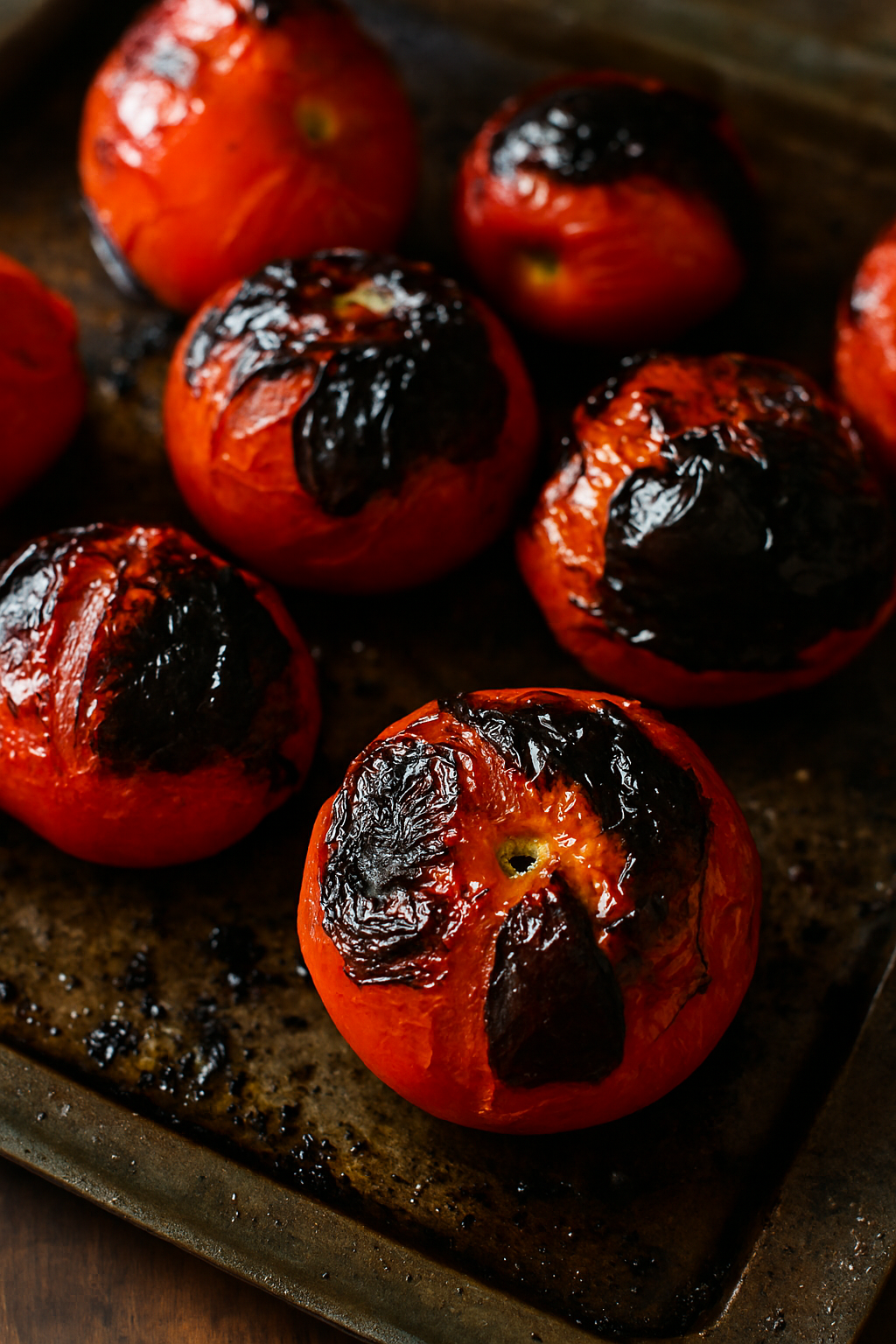
Fire roasting isn’t just about aesthetics—it’s a flavor revolution. When tomatoes are exposed to high heat, several things happen:
• Water evaporates, concentrating sugars and acidity.
• Skins blister and char, adding smoky depth.
• Texture softens, making tomatoes juicy and jammy.
This technique is especially useful when tomatoes are slightly underripe or bland. Roasting brings out their best qualities, making them taste like they’ve been sun-ripened on the vine.
Choosing the Right Tomatoes For Roasting
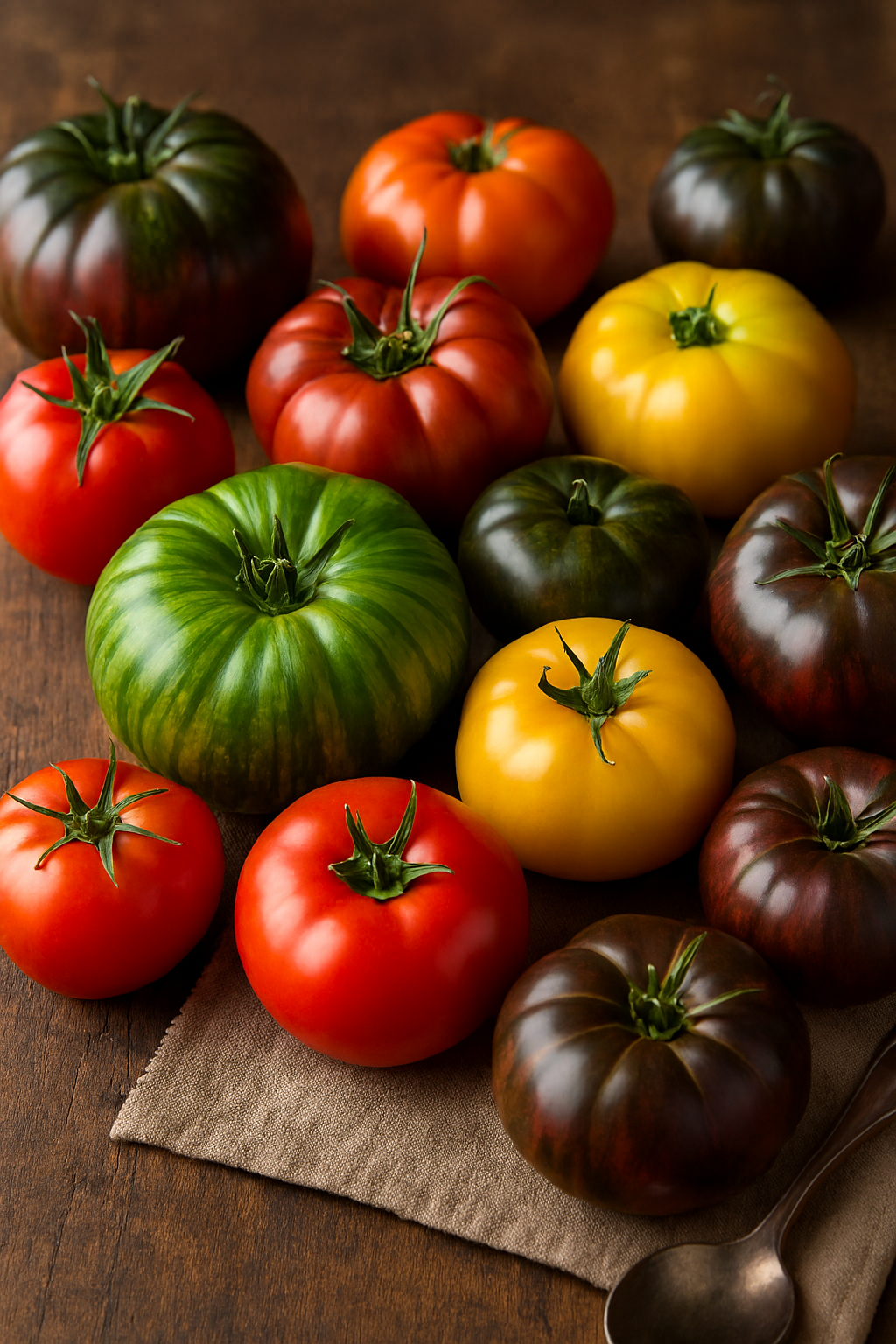
While you can roast nearly any variety, some types perform better than others. Here’s how to choose:
• Roma (Plum): Meaty and low in moisture, ideal for sauces and freezing.
• Cherry or Grape: Naturally sweet, caramelize beautifully, great for salsas and salads.
• Beefsteak: Juicy and large, perfect for chunky sauces and bruschetta.
• Heirloom: Complex flavors and vibrant colors, best for gourmet dishes.
Tips for selection of Tomatoes
• Choose tomatoes that are ripe but firm.
• Avoid overripe tomatoes—they may collapse and become mushy.
• Wash thoroughly and dry before roasting.
Methods for Fire Roasting Tomatoes
There are three main ways to fire roast tomatoes at home. Each method offers a slightly different flavor and texture.
1. Grill Method (Most Smoky)
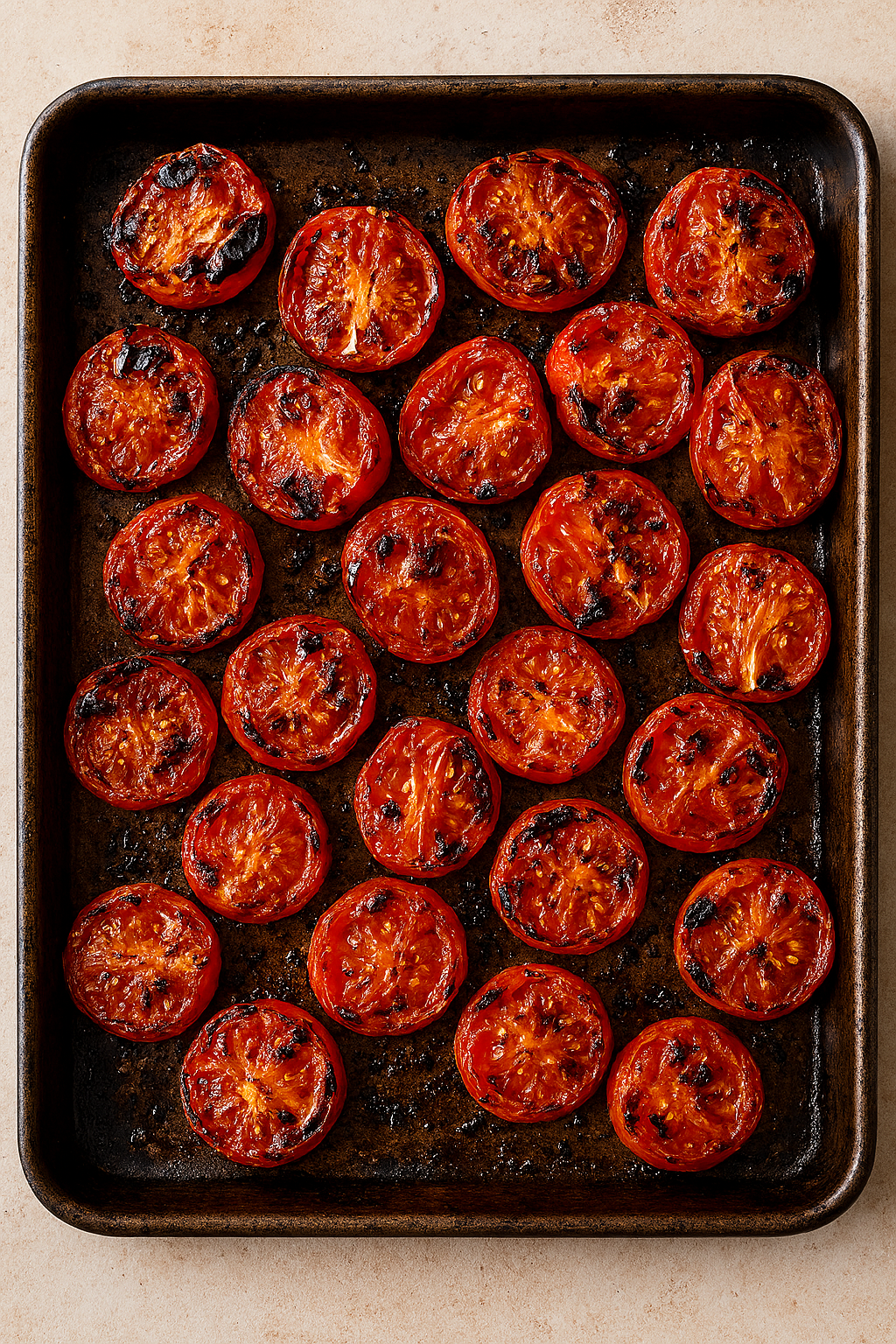
What you need:
• Fresh tomatoes
• Olive oil
• Tongs or skewers
• Grill basket (for small tomatoes)
Steps:
• Preheat grill to medium-high (around 450°F).
• Lightly brush tomatoes with olive oil.
• Place directly on grill grates or in a grill basket.
• Grill for 5–10 minutes, turning occasionally.
• Look for blistered, blackened skins and softened flesh.
• Transfer to a bowl and cover to steam (loosens skins).
• Peel (optional), chop, and use or store.
The tomatoes will turn deeply smoky, slightly sweet, rustic.
2. Oven Broiler Method (Most Convenient)
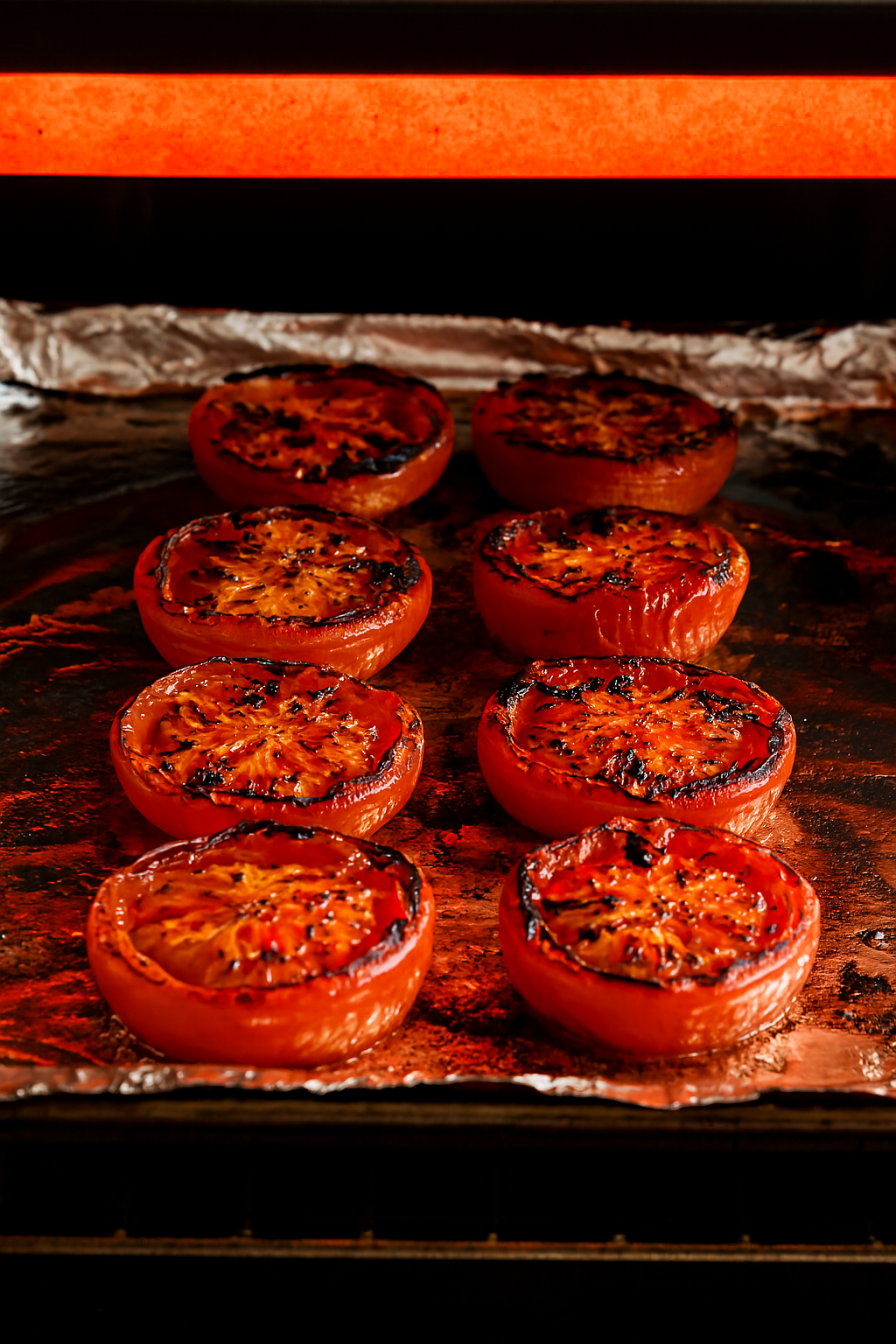
What you need:
• Baking sheet
• Aluminum foil or parchment
• Olive oil
• Salt and pepper
Steps:
• Preheat broiler to high.
• Halve tomatoes and place cut-side down on lined baking sheet.
• Drizzle with olive oil and season.
• Broil for 15–20 minutes, rotating pan halfway.
• Skins should blacken and blister.
• Let cool, peel, and chop or blend.
This way the tomatoes will be sweet, slightly smoky, caramelized.
3. Open Flame Method (Quickest for Small Batches)
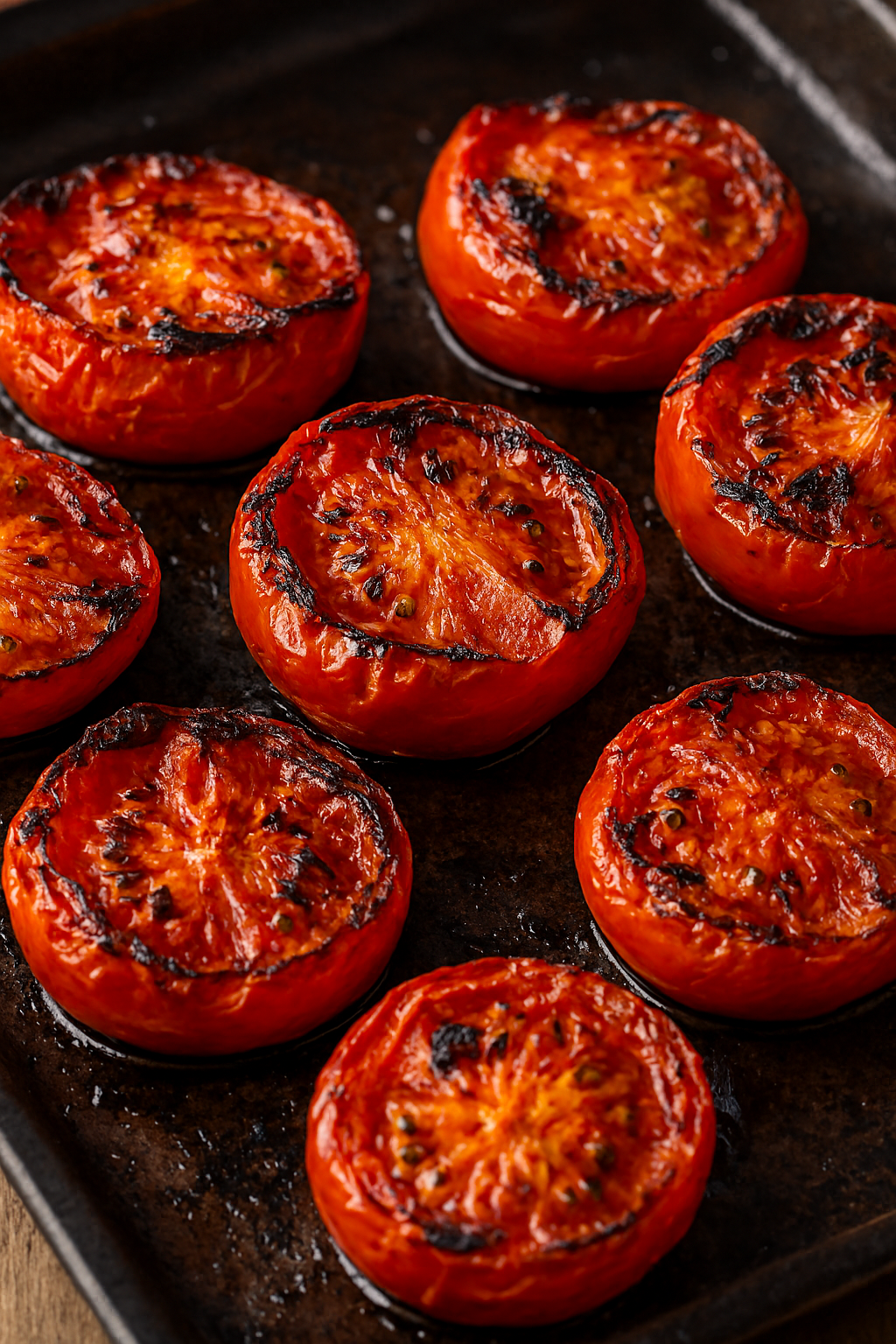
What you need:
• Gas stove or kitchen torch
• Tongs or skewers
Steps:
• Skewer tomatoes or hold with tongs.
• Roast directly over flame, turning until skins char.
• Steam in a covered bowl to loosen skins.
• Peel and use immediately.
This will make the tomatoes intense char, great for salsas and quick sauces.
Flavor Variations and Seasoning Ideas
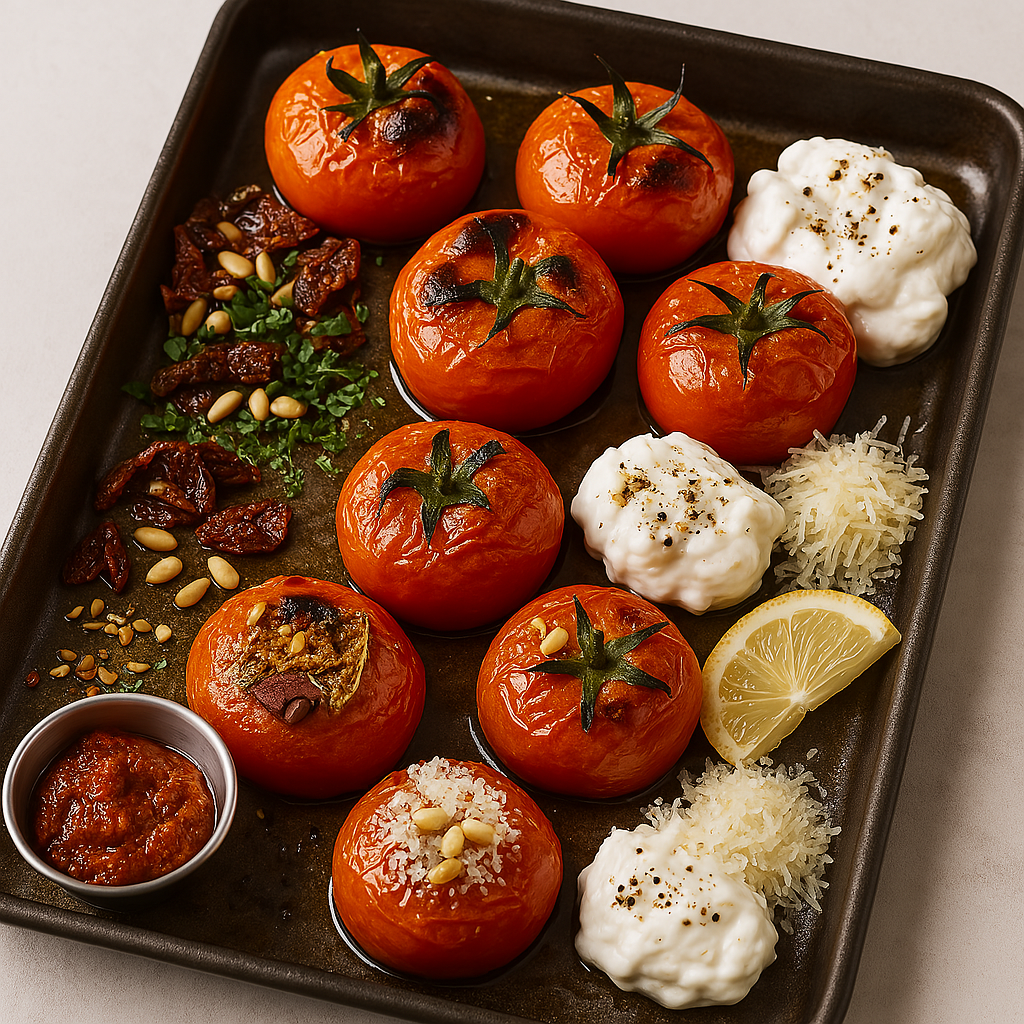
Fire-roasted tomatoes are a blank canvas for herbs and spices. Customize them to suit your dish:
Italian-style:
• Add rosemary, garlic cloves, and balsamic vinegar.
• Use for pasta sauces or bruschetta.
Mexican-style:
• Sprinkle with oregano, cumin, and chili powder.
• Perfect for salsas and enchiladas.
Smoky-sweet:
• Add smoked paprika and a pinch of brown sugar.
• Great for barbecue sauces and chili.
Middle Eastern twist:
• Use za’atar, sumac, and olive oil.
• Ideal for dips and roasted veggie bowls.
Roast onions, garlic, or bell peppers alongside for a richer flavor base.
Styling Tips for Roasted Tomatoes

If you’re photographing or filming your fire-roasted tomatoes, presentation matters. Use these tricks:
• Highlight charred skin for dramatic contrast.
• Let juices glisten for a mouthwatering effect.
• Add fresh herbs for color and freshness.
• Use side lighting to emphasize texture and depth.
• Include props like rustic bowls, cutting boards, or cast iron pans.
Storage and Preservation
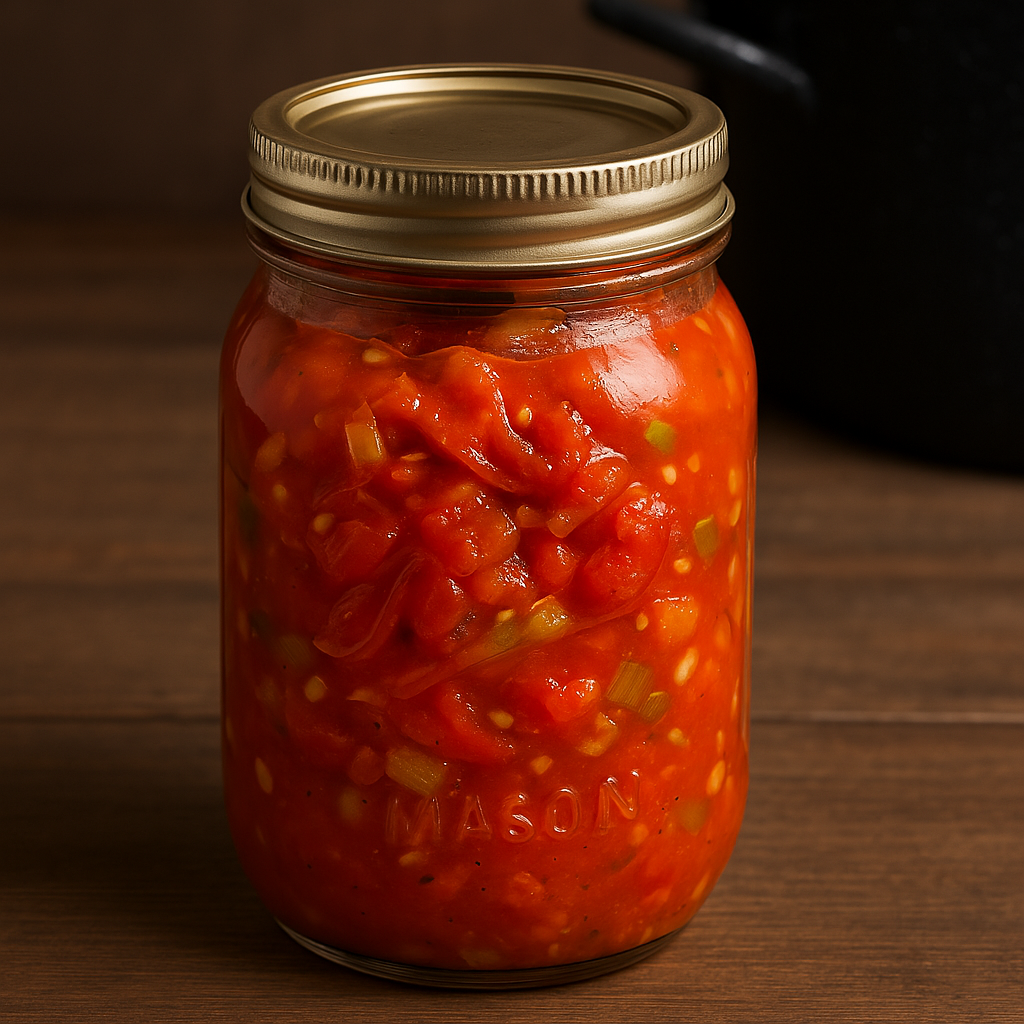
Fire-roasted tomatoes store beautifully for short- and long-term use.
Short-Term Storage
• Refrigerate in airtight containers for up to 5 days.
• Freeze in bags or containers for up to 6 months.
• Include juices—they’re packed with flavor.
Long-Term Canning
• Sterilize jars and lids.
• Add 1 tbsp bottled lemon juice per pint jar (for safe acidity).
• Fill with hot roasted tomatoes, leaving ½-inch headspace.
• Wipe rims, seal with lids, and process in boiling water bath for 45 minutes.
• Store sealed jars in a cool, dark place for up to 1 year.
Label jars with date and variety for easy tracking.
Delicious Ways to Use Fire-Roasted Tomatoes
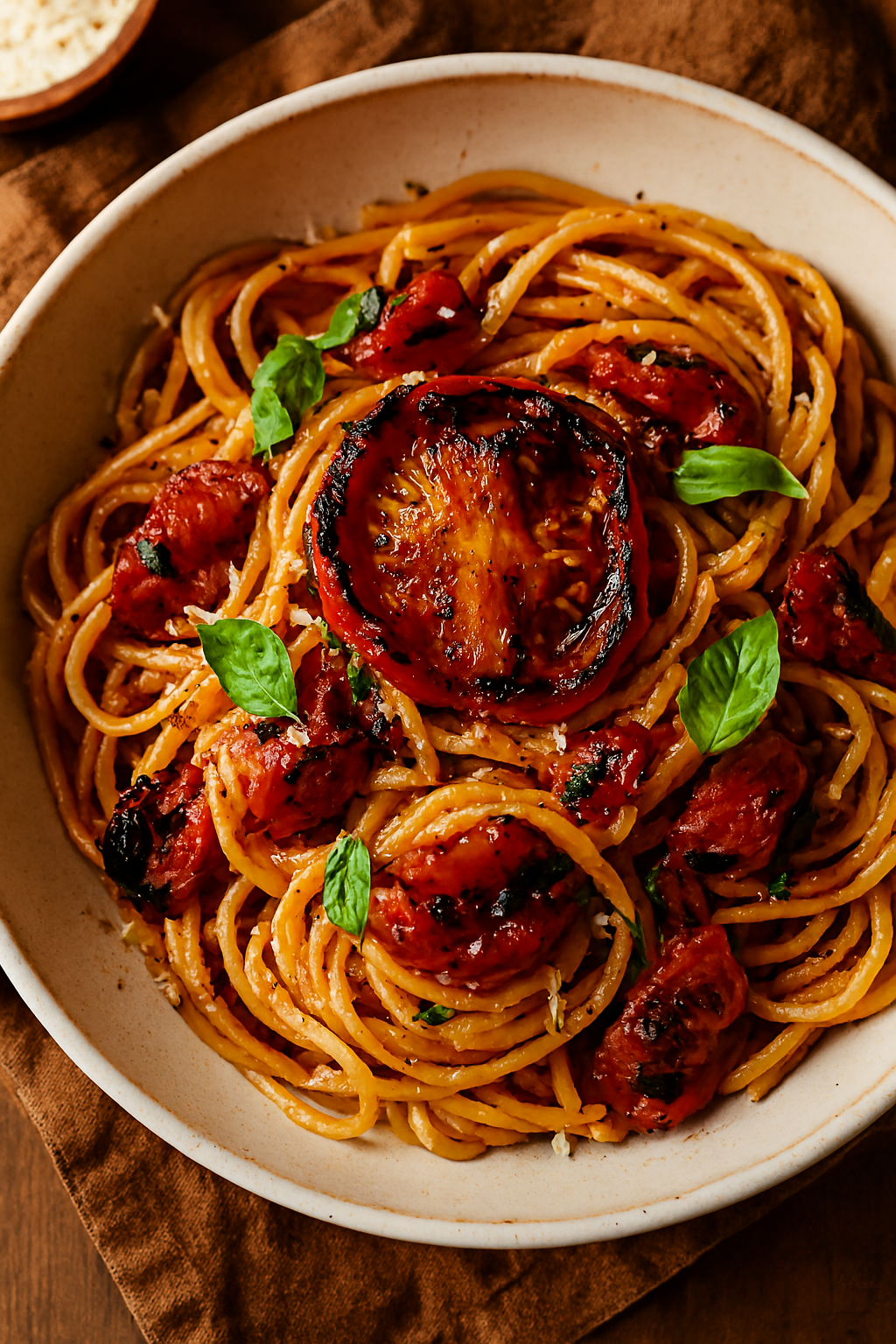
These smoky, sweet tomatoes are incredibly versatile. Try them in:
• Pasta sauces: Blend with garlic, basil, and olive oil.
• Soups: Add to tomato soup, minestrone, or lentil stew.
• Salsas: Mix with onion, cilantro, lime, and jalapeño.
• Shakshuka: Simmer with spices and poach eggs on top.
• Pizza: Use as a smoky base sauce or chunky topping.
• Chili: Adds richness and umami to meat or veggie chili.
• Bruschetta: Spoon onto toasted bread with olive oil and basil.
• Curries: Blend into Indian or Thai curry bases for depth.
• Tacos and tostadas: Use as a topping or base layer.
• Grain bowls: Mix with quinoa, rice, or couscous.
Pro Tips for Roasting Success

Maximize flavor and texture with these expert tips:
• Don’t overcrowd the pan—space ensures even roasting.
• Keep the skins for added flavor (or peel for smooth sauces).
• Save the juices—they’re packed with smoky sweetness.
• Use a wire rack under tomatoes for better airflow and char.
• Steam tomatoes after roasting to loosen skins naturally.
• Roast in batches if needed—consistency matters.
Fire roasting triggers the Maillard reaction, a chemical process that occurs when amino acids and sugars are exposed to high heat. This reaction creates the savory, complex flavors we associate with grilled meats and roasted vegetables.
In tomatoes, it enhances sweetness, reduces acidity, and adds rich umami. The charred skin contributes phenolic compounds that deepen the smoky profile—making fire-roasted tomatoes a flavor powerhouse.
Troubleshooting Common Issues
If your tomatoes aren’t roasting properly, here’s what to check:
• Too watery? Use firmer varieties like Roma or reduce roasting time.
• Not charring? Increase heat or move closer to flame.
• Burning too fast? Lower heat slightly and rotate more often.
• Too mushy? Shorten roasting time or use less ripe tomatoes.
Wrapping Up
Fire-roasting tomatoes is a simple yet transformative technique that brings out the best in this humble fruit.
Whether you’re grilling in summer or broiling in winter, the result is always worth the effort: rich, smoky, and deeply satisfying tomatoes that elevate any dish.
Once you try it, you may never go back to canned again.
Leave a Reply